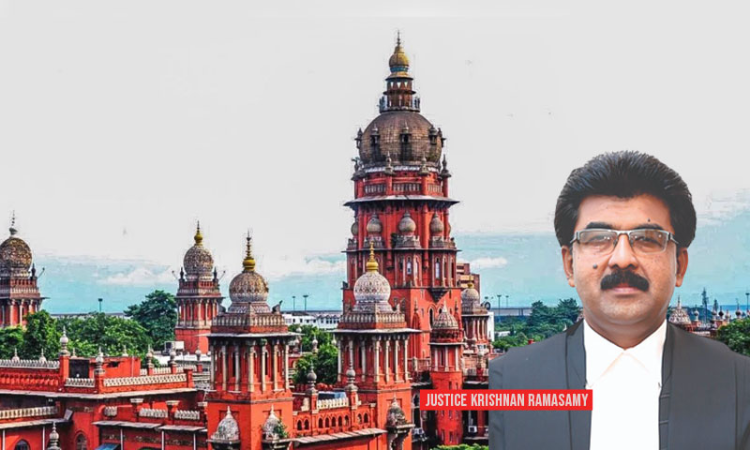- Home
- /
- High Courts
- /
- Madras High Court
- /
- Hostel Service Constitutes...
Hostel Service Constitutes 'Residential Dwelling Unit' For Girl Students And Working Women, Will Be Exempt From GST: Madras High Court
Upasana Sajeev
27 March 2024 4:30 AM GMT
The Madras High Court has recently ruled that Hostel services providing welling to girl students and working women will be exempt from the GST regime as they are residential dwelling units for the girl students and working women. Justice Krishnan Ramasamy stressed the work “residential dwelling” referred to in Entry 12 of the Exemption Notification No. 12 of 2017 would include...
The Madras High Court has recently ruled that Hostel services providing welling to girl students and working women will be exempt from the GST regime as they are residential dwelling units for the girl students and working women.
Justice Krishnan Ramasamy stressed the work “residential dwelling” referred to in Entry 12 of the Exemption Notification No. 12 of 2017 would include hostel facilities also. While noting that residential dwelling varies from person to person, the court added as far as hostellers were concerned, after their avocation, they stay, sleep, eat, wash etc in the hostel rooms alone thus making it their residential dwelling.
“Ultimately, the Authorities have to look into the aspect as to whether the particular place is a dwelling unit or not. When such being the case, since the hostellers are staying in the room for months together, it cannot be construed as non-residential unit and certainly it is a residential dwelling as provided in the Entry No.12 of Exemption Notification No.12 of 2017. Thus, this Court has no hesitation to hold that the 'hostel services' provided by the petitioners would squarely fall within purview of Entry No.12 of Exemption Notification No.12 of 2017,” the court observed.
The court added that in order to claim exemption of GST, the end use of the dwelling must be residential and not commercial. The court observed that levy of GST should be viewed from the perspective of recipient of service and not from the perspective of service provider. The court added that the purpose of the exemption was to lessen the burden of tax on the dwellers, who were tenants/occupants of the residential premises taken on rent.
The court was hearing a batch of pleas filed by persons running private ladies hostel challenging the decision of Tamil Nadu State Appellate Authority for Advance Ruling to not exempt them from payment of GST. The ladies' hostels had claimed that since they were providing residential accommodation, which could be termed as residential dwelling, the charges/rent/tariff collected by them qualifies for GST exemption. Reliance was also placed on the decision of Karnataka High Court in Taghar Vasudeva Ambrish vs. Appellate Authority for Advance Ruling wherein the court had held that services provided by leasing out residential premises as hostel for students and working professional was exempted.
The Additional Advocate General, on the other hand argued that an SLP had been preferred against the decision of the Karnataka High Court and since the matter was sub-judice the same could not be referred to by the petitioners. It was also submitted that the services provided by the petitioners would not be covered under residential dwelling since they were letting out a single room to various inmates for various time periods for pecuniary benefit. It was also argued that license and permits was necessary for running hostel services while the same was not necessary for renting out. Thus, it was argued that hostel building could not be termed as residential dwelling but could only be termed as non-residential complex.
The court noted that exemption was given to any person who may engage in renting of residential dwelling used as residence. The court thus opined that hostel would also be covered under the meaning of residential dwelling.
The court noted that the authority, while denying exemption had not ventured upon to find whether the accommodation/premises was used as residential dwelling or as commercial purpose. The court noted that the authority had merely compared the renting of hostel rooms to hotels and come to the conclusion that the same was not for residential purpose.
The court added that the imposition of GST should be viewed from the perspective of the recipient of service and not from the perspective of service provider. In the present case, since the end use of the premises was for residential purpose and not commercial purpose, the court found the order of the authority to be unsustainable and set aside the order.
Counsel for the Petitioner: Ms.Aparna Nandakumar
Counsel for the Respondent: Mr.A.P.Srinivas, Sr.Standing Counsel for Customs & GST, Mr.Rajanish Pathiyil, Senior Panel Counsel, Mr.Sai Srujan Tayi, Senior Panel Counsel, Mr.B.Ramanakumar, Mr.Haja Nazirudeen, Addl.Advocate General-I, asst.by Mr.V.Prasanth Kiran
Citation: 2024 LiveLaw (Mad) 132
Case Title: Thai Mookambikaa Ladies Hostel v. Union of India
Case No: W.P.No.28486 of 2023


